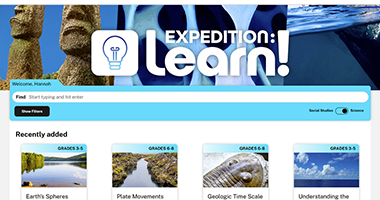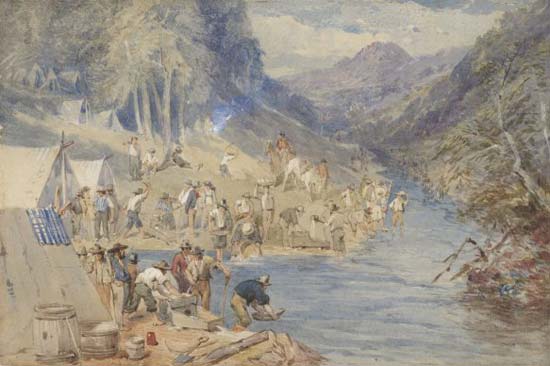What was it like to be working on the goldfields during the Australian Gold Rushes? Explore the life and times of the 19th century diggers who struck for gold.
The discovery of gold in New South Wales in 1851 began the first of a series of gold rushes in colonial Australia. The lure of gold attracted miners, known as diggers, from all over the world.
Tens of thousands of people – blacksmiths, butchers, farmers, ex-convicts, merchants, doctors, lawyers, and priests – left their homes and jobs to work in dangerous and harsh conditions on the Australian goldfields. Some struck it rich. Most did not. But all contributed to a defining era of Australian history.
The following lesson plan is designed for primary school students using resources from Britannica School. Contact your library staff to find out if your institution already has access to Britannica School or claim your own free trial.
Unit Title
Australia Gold Rushes
Year
Primary Years 3-5
Key Learning Areas
History, Humanities and Social Sciences
Curriculum Links
Australian Curriculum
| Code | Elaborations | |
|---|---|---|
| ACHASSK108 | The impact of a significant development or event on an Australian colony | Investigating an event or development and explaining its economic, social and political impact on a colony (for example, the impact of the Eureka Stockade on the development of democracy) |
| ACHASSK109 | The reasons people migrated to Australia and the experiences and contributions of a particular migrant group within a colony | Identifying the reasons why people migrated to Australia in the 1800s (for example people seeking a better life such as gold miners) |
NSW Curriculum
| Code | ||
|---|---|---|
| HT3-1 | Describes and explains the significance of people, groups, places and events to the development of Australia | |
| HT3-5 | Applies a variety of skills of historical inquiry and communication |
VIC Curriculum
History / Levels 5 and 6 / Historical Knowledge / The Australian Colonies
| Code | Elaborations | |
|---|---|---|
| VCHHK090 | The effects of a significant development or event on a colony. | Exploring frontier conflict, the gold rushes, the Eureka Stockade, internal exploration, the advent of rail, the expansion of farming, drought. |
| VCHHK091 | The causes and the reasons why people migrated to Australia from Europe and Asia, and the perspectives, experiences and contributions of a particular migrant group within a colony. | Identifying the causes and reasons why people migrated to Australia in the 1800s, for example, as convicts; assisted passengers; indentured labourers; people seeking a better life such as gold miners; and those dislocated by events such as the Industrial Revolution, the Irish Potato Famine and the Highland Clearances. |
Assessment:
- Various work samples based on tasks completed e.g. artwork or map.
- Observation of students as they research and work through the task elements.
Resources:
- Internet access
- Device
- Various art materials
Introduction:
Using Britannica School’s Primary level article on Australian Gold Rushes, create a Class Museum Exhibit to collectively display students work. Invite the school community to view it.
Museum exhibits are visual and use short, precise, easy-to-read language. Nowadays many exhibits leverage modern technology, allowing visitors to access more information through interactive, video or audio presentations.
By creating a Class Museum Exhibit, your students will be given an authentic audience and therefore a purpose to their project. It will also encourage creativity and ICT skills, as well as allow students of all abilities to contribute to the display.
Visitors can celebrate the students work and provide evaluations and feedback.
Teaching Strategies / Learning Experiences:
For their contribution to the Class Museum Exhibit, students must address at least 3 of the following tasks and present their responses creatively in the form of text, images, videos, dioramas or other media.
1. Open the Australian Gold Rushes article. Read the Introduction, when was gold first found in Australia?
2. Describe what happened after the first discovery. Read Gold Discoveries to help your description.
3. Use the image Australian Gold Rushes and the article Mining Technology: Overview (State Library Victoria) to research and describe mining techniques used on the goldfields.
4. Use the Australian Gold Rushes article to create a glossary of key gold fossicking and mining words.
5. Research and create a map of goldfields and mines in either NSW, Victoria, Queensland or Western Australia.
6. Read the paragraph about Life on the Goldfields. Imagine you are a person living and working on the goldfields during the Australian Gold Rushes. Create a journal describing a day in your life.
7. Watch the video Australian Gold Rushes. Use the information to create an artwork or illustration demonstrating life on the goldfields for a woman.
8. Which of the bushrangers operated on the goldfields? Make a list, and select one to research in depth. Create a biography of the bush ranger using resources from Britannica School.
- Ned Kelly
- Ben Hall
- Captain Lightning
- Frank Gardiner
- Thunderbolt
9. What was the Eureka Stockade? Create a brochure illustrating Who, What, When, Where and Why.
For Fun!
Play Can you Strike it Rich During the Gold Rush by the National Museum of Australia to learn more about the Gold Rush and life during this time.
Sources:
ABC (2010) Behind the News – Classroom Episode 2 Teacher Resource [online pdf] Available at: http://www.abc.net.au/btn/resources/teacher/episode/20100223-goldrush.pdf [Accessed 05 March 2019]
Featured Image from BRITANNICA SCHOOL: People panned for gold in the Bendigo region of Victoria, Australia, during the gold rush of 1851. National Library of Australia.
More Educator Resources
Sign up with your email for more free resources from Britannica.
Get full access to Britannica School any time, on any device with a school-wide subscription. Request a quick tour or get started free.

